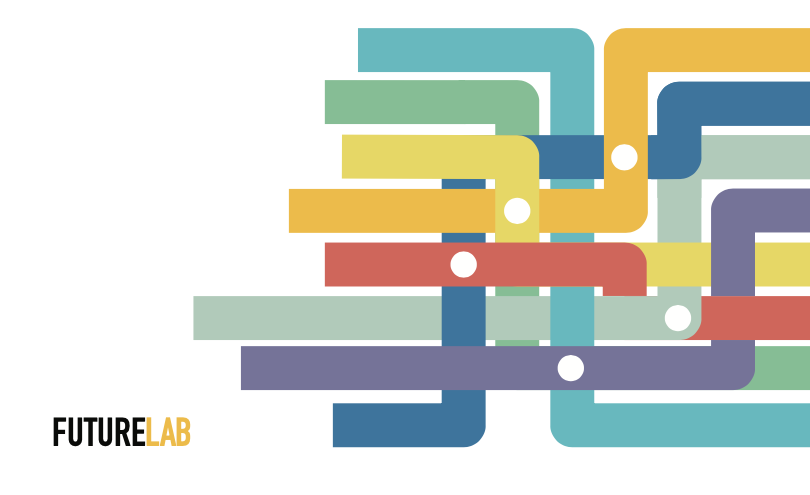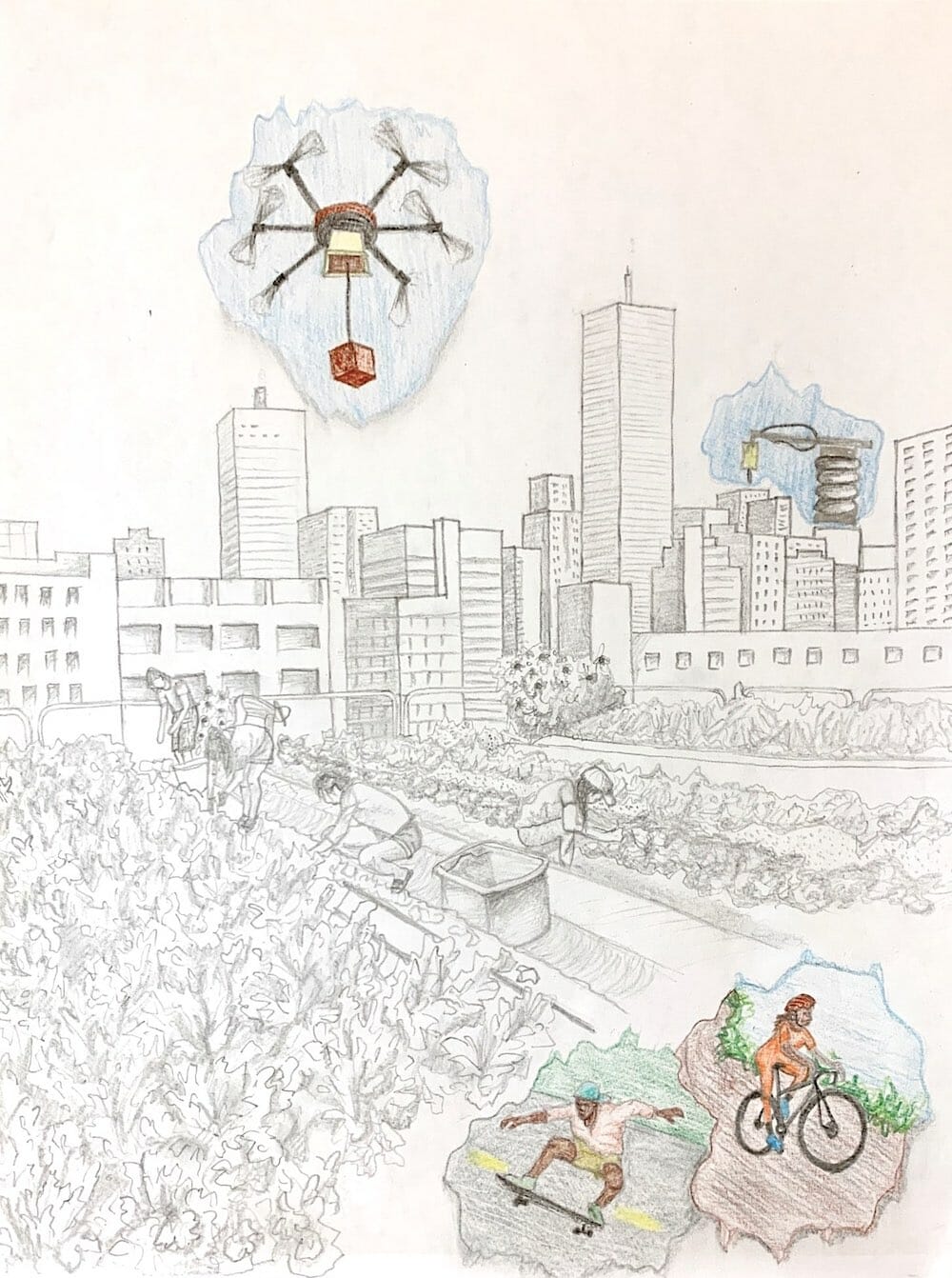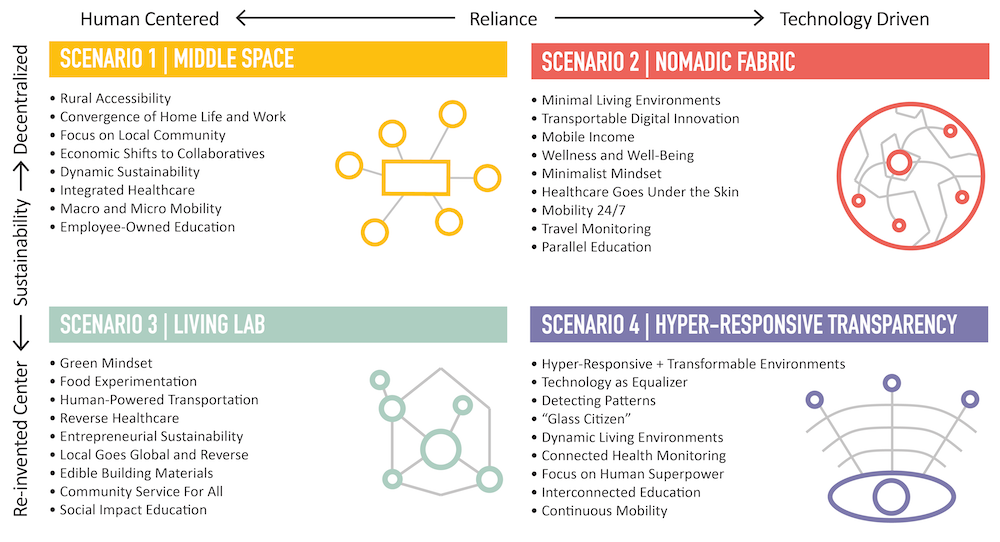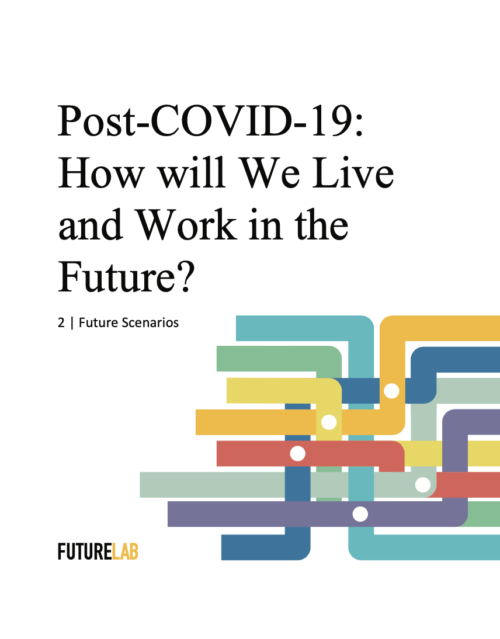Post COVID-19: How will we live and work? Wentworth Students Explore via the FutureLab
The COVID-19 pandemic continues to have an enormous impact on the world, our lives, and our work situations. When the pandemic changed Wentworth student options for work-based learning, the university created a future program to fill the gap of real world experience.

By Monique Fuchs, Associate Vice President, Innovation + Entrepreneurship // Founder FutureLab, Wentworth Institute of Technology and Anne-Catrin Schultz, Associate Professor, Architecture // Faculty Mentor, FutureLab, Wentworth Institute of Technology
Preparing for Disruptions
The COVID-19 pandemic continues to have an enormous impact on the world, our lives, and our work situations. When considering the future, we face a myriad of possibilities that impact the choices we make and the paths we can take. The Oxford Scenarios Programme calls out TUNA conditions: turbulence, uncertainty, novelty, and ambiguity, which are always present, disruptive, and command mixed emotions ranging from excitement and imagination to worry and fear.
Plausible Futures
Royal Dutch Shell has been pioneering and refining Future Scenarios Planning as a valuable tool to develop strategy since 1965, guiding many organizations to explore a path toward alternate and plausible futures. These futures may never happen in their entirety, they are not predictive nor do they rely on data or models to calculate risks or reference the past. However, they can provide insights to organizations and communities and inform their strategies, services, and products. Future scenarios enable an organization to innovate and respond nimbly to potential disruptions in the future, while also honoring the multiplicity of issues inherent to complex challenges.
Most leaders’ thinking is based on the past, not the future.
-Rafael Ramirez, Oxford University
Talent of the Future
The COVID pandemic has demonstrated that organizations and people have the potential to pivot. Individuals moved from office to home, from in-person to remote, from crowded to socially distant in a matter of a few short months. What if those transitions would have been in the works for years? Likely our preparedness would have eliminated or minimized disruption and immediately sustained social and economic functions. The employee of the future will benefit from the ability to envision, re-invent, and navigate an uncertain future with a nimble, resilient, and innovative mindset while thriving in ambiguous environments.
Education plays a critical role in the development of future talent. Higher education’s mission is to develop a launchpad for students to advance their skills, employability, and economic mobility. Often this is accomplished through internships or cooperative education. At the Wentworth Institute of Technology, a private university in Boston, project-based education is combined with practice-based co-ops. This creates the ability for students to contribute to real challenges in professional organizations and practice critical skills and competencies for their long-term career success.
Although the co-op model is impactful under typical circumstances, when the COVID-19 crisis hit, Wentworth students had difficulty securing co-op positions, as many companies froze recruiting. Turning this crisis into an innovation opportunity, Accelerate, Wentworth’s Innovation + Entrepreneurship Center, partnered with the Wentworth architecture department to introduce an immersive FutureLab, a creative co-op alternative. FutureLab set out to develop future-proof competencies among students and to actively contribute to thought leadership across a variety of industries leading with the question: “Post COVID-19: How will we live and work in the future?”
The FutureLab
For 13 weeks, 40 Student Innovation Fellows working in remote teams stepped beyond their discipline knowledge to explore plausible futures. They interacted with numerous professionals representing industry, community organizations, and the city of Boston to discover driving forces and trends across a variety of diverse disciplines. Fellows also utilized a series of tools related to design thinking, applied research, stakeholder interviews, and future scenarios planning, which are not traditionally part of the toolkit within their fields of study. These tools provide the nurturing ground for competencies desirable in any employee.

Sketch by Sofia Katona, Arch ‘21
Future Scenarios
After the initial five weeks, student teams produced 28 scenarios across a variety of sectors, such as future of work, education, technology, role of community, healthcare, urban fabric, food security, and our radius of interaction.
Out of these 28 narratives, the following four future “super” scenarios were aggregated:
Scenario 1 | Middle Spaces – Decentralized hubs promote hyperlocal focus.
Scenario 2 | Nomadic Fabric – Loosely coupled global ties to live and work anywhere.
Scenario 3 | Living Lab – Cities turn into experimentation hubs and destinations.
Scenario 4 | Hyper Responsive Transparency – Pervasive technology facilitates instant individual and environmental adaptation.

Graphic by Tory Lam, Wentworth Accelerate
Path Forward
This pandemic illustrates that we can no longer ignore systemic inequalities, societal, urban, and environmental issues. Present and future challenges require a multidisciplinary discourse and the ability to look ahead while developing leadership, ideas, and scalable solutions. Future scenarios planning is a valuable tool to cast alternative maps of the future. In an educational context, it increases student employability. For industries, it supports innovation, employee, and organizational readiness, to address any future disruptions caused through pandemics, climate change, and beyond.
